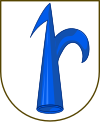Neksø
| Nexø | ||
|---|---|---|
| Town | ||

Railway museum in Nexø
|
||
|
||
| Location on Bornholm | ||
| Coordinates: 55°03′N 15°07′E / 55.050°N 15.117°E | ||
| Country | Denmark | |
| Region | Capital (Hovedstaden) | |
| Municipality | Bornholm | |
| Population (2015) | ||
| • Total | 3,642 | |
| Time zone | CET (UTC+1) | |
| • Summer (DST) | CEST (UTC+2) | |
Nexø, sometimes spelled Neksø, is a town on the east coast of the Baltic island of Bornholm, Denmark. With a population of 3,642 (as of 1 January 2015), it is the second largest town, as well as the largest fishing port on the island. Fishing is the mainstay of the town's economy. Nexø is also the site of a distillery (Bornholmske Spiritfabrik ApS) and a mustard factory (Bornholmersennep ApS). The town is also a port of call for the passenger ferries linking Bornholm with Kołobrzeg, Darłowo, and Ustka in Poland.Dueodde, the largest beach on Bornholm, is located south of Nexø, in the southeastern corner of the island.
"Nexø" is possibly a combination of the Old Norse elements "nøkke", meaning Nix or water spirit, and "sæ" (sea). It was first documented in 1346 as Nexe.
Nexø originated as a fishing village for the parish of Bodilsker with a chapel attached to St Bodil's Church. In 1346, it was granted rights as a market town, dealing in both the herring trade and in agricultural products. Over the centuries the town has suffered a number of disasters. The Lübeckers burned the town in 1510, in 1563 most of the inhabitants died from the plague and in 1645 it was plundered by 500 Swedish soldiers. In 1756 there was another serious fire and in 1872 a storm damaged the harbour.
Around 1800, the town became Bornholm's administrative centre. In 1806, 21 ships and 47 boats were registered with Nexø as their home port. In 1879, a new harbour basin was completed and, in 1892, Denmark's first communal drydock was opened. There were a number of subsequent extensions to the harbour facilities. The 19th century also saw the development of ship building, the foundation of an iron foundry (1864) and of the Østbornholmske Dampskibsselskab (East Bornholm Steamship Company) which operated a regular service to Copenhagen from 1877.
At the end of World War II, on 7 and 8 May 1945, Nexø (like Rønne) was bombed by Soviet aircraft when Gerhard von Kamptz, the commander of the German forces occupying Bornholm, refused to surrender, causing total destruction of the town centre on the harbour and the main square. To ease the ensuing housing problem, the Swedish State donated 175 wooden houses to the town. The Soviets had alerted the civilian population in advance, therefore the air raid only resulted in ten fatalities. Although the rest of Denmark had been liberated on 4 May, the Red Army occupied Bornholm from 9 May 1945 to 5 April 1946, when an agreement was reached with the Danish authorities and the island finally came under Danish rule once more.
...
Wikipedia


